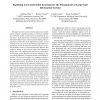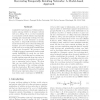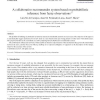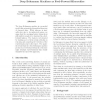173 search results - page 13 / 35 » Inferring Network Invariants Automatically |
145
Voted
ICDM
2008
IEEE
15 years 8 months ago
2008
IEEE
This paper presents a data oriented approach to modeling the complex computing systems, in which an ensemble of correlation models are discovered to represent the system status. I...
115
Voted
ICML
2007
IEEE
16 years 3 months ago
2007
IEEE
A plausible representation of relational information among entities in dynamic systems such as a living cell or a social community is a stochastic network which is topologically r...
101
click to vote
FSS
2008
15 years 2 months ago
2008
The problem of building recommender systems has attracted considerable attention in recent years. The objective of this paper is to automatically suggest and rank a list of new it...
144
Voted
SIGMOD
2010
ACM
15 years 7 months ago
2010
ACM
Real-world databases often contain syntactic and semantic errors, in spite of integrity constraints and other safety measures incorporated into modern DBMSs. We present ERACER, an...
187
Voted
JMLR
2012
13 years 4 months ago
2012
The deep Boltzmann machine is a powerful model that extracts the hierarchical structure of observed data. While inference is typically slow due to its undirected nature, we argue ...




